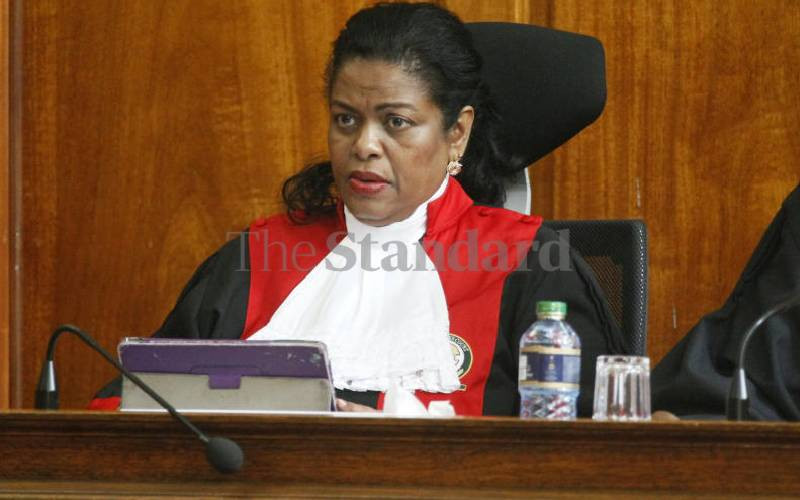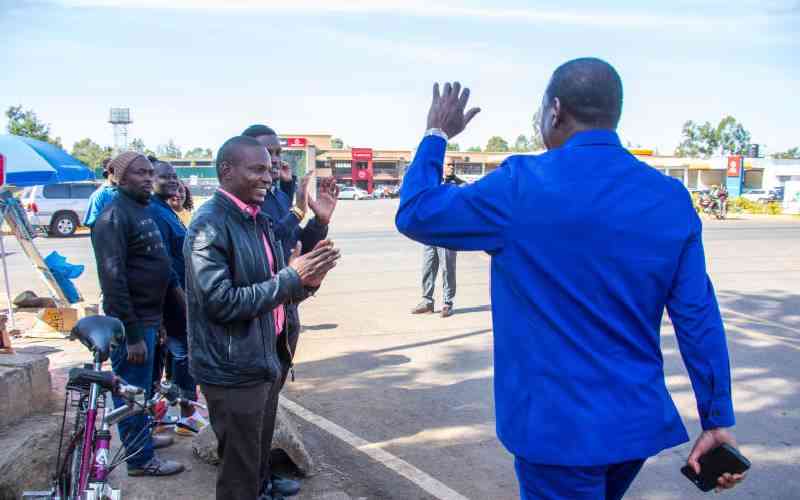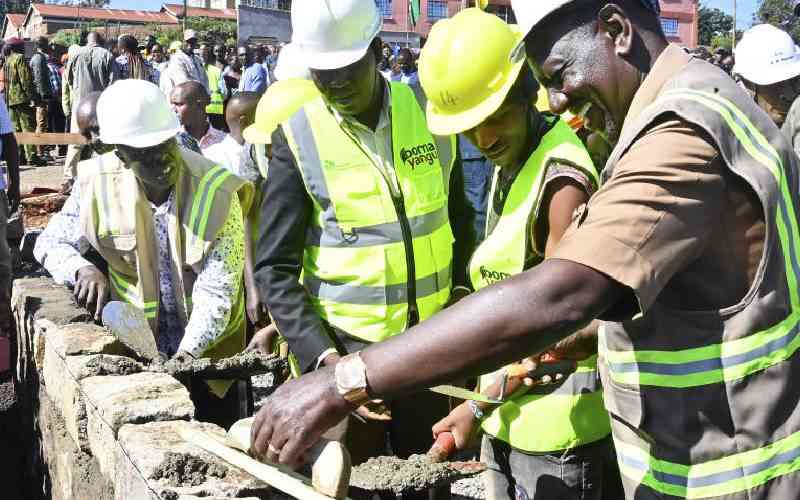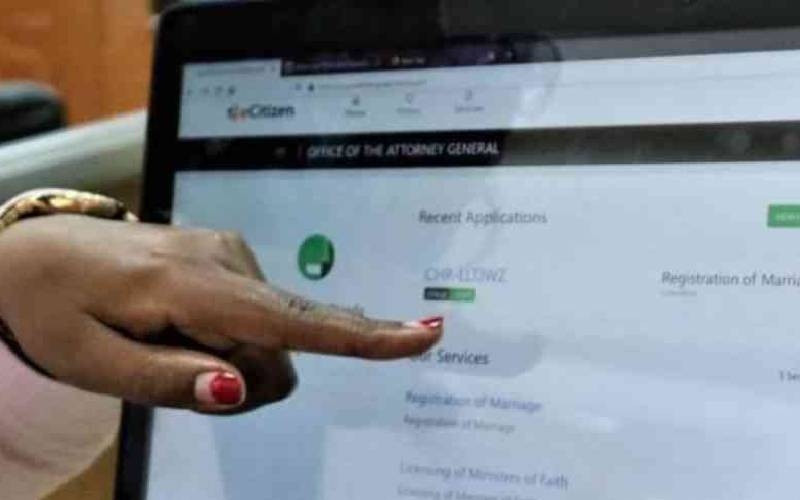The wheels of Justice could soon grind to a halt following an imminent judicial crisis after three Supreme Court judges, officially issued a threat to down tools.
In what exposes an acrimonious relationship that has plunged to new levels of hostility and anger, three Supreme Court judges have warned the Judicial Service Commission (JSC), that the institution would unavoidably sink into a standstill should JSC continue with “illegitimate interference”.
Through a protest letter dated September 24, a copy of which was exclusively obtained by The Standard on Sunday, Justices Mohammed Ibrahim, Jackston Ojwang' and Lady Justice Njoki Ndung’u said: ”The Supreme Court must uphold the terms of the Constitution strictly. Any illegitimate interference with the work of the court, or its seven members will necessitate a moratorium on all of its judicial operations with immediate effect.”
The rift between the JSC and the Supreme Court seems to have been sparked by a decision by JSC to suspend and retire Justice Philip Tunoi and Deputy Chief Justice Kaplana Rawal.
The judges, without mincing words, told JSC that it has no supervisory powers over the conduct of judicial work, and cannot determine how and when a judge may perform his/her judicial duty including when she/he may sit or may not sit in court, neither can it terminate the service of a judge.
Multiple sources within Judiciary said succession politics is at the heart of the conflict between the judges and JSC and the dispute over the retirement of Chief Justice Willy Mutunga.
Crisis meeting
In fact, in their letter to JSC, the judges have quoted a court order to the effect that: “A lawful court order recognised that the Justice Philip Tunoi continues to discharge his duties in accordance with the Constitution. That lawful court order must apply and bind all the judges of the Supreme Court and the JSC and all and sundry. We believe that JSC has no competence to purport to change that position outside of the framework of a court process to which indeed it’s already a party.”
A JSC commissioner, who wished not want to be named, confirmed that JSC already received the letter and held a crisis meeting on Friday. The resolution of the Friday meeting, according to the commissioner, was that JSC agreed to take a common position: “We shall not be intimidated by such blackmail”.
“I can confirm we received the letter and daggers are out on this issue. What basically the judges are trying to tell us is that if we don’t allow the two judges who are in the process of retirement to sit, then they will down their tools. But we also told them that this is unacceptable blackmail. That is so far as we have gone,” said the commissioner.
In their letter, the judges said JSC gave itself powers it does not have under the Constitution to suspend two Supreme Court judges from hearing any cases until their respective cases challenging a decision to retire them is heard and determined.
The Deputy Chief Justice did not sign the letter although she is said to have been present in the meeting. Justice Tunoi was however absent.
Others who did not attend the meeting are Chief Justice Willy Mutunga and Justice Smokin Wanjala because they sit in JSC which is chaired by Dr Mutunga.
“Members of the Supreme Court at a conference sitting on September 22, discussed the import of the directive, and resolved to communicate with JSC,” reads part of the letter.
This came as details emerged that the Commission on the Implementation of the Constitution (CIC) chairman Charles Nyachae has already written to JSC expressing concern over the manner in which the dispute is being handled.
Stay informed. Subscribe to our newsletter
Mr Nyachae told The Standard on Sunday that he wrote to JSC saying: “It is true I wrote and what we wrote to JSC about was to express concern. The issue is that you cannot have a scenario where people, particularly judges of the Supreme Court, continue to be judges and you are saying they cannot sit as judges. Then there is a problem. We found that to be a negation of the spirit of the Constitution. This therefore means, and I said it in my letter, that the issue must be resolved. We suggested to the Chief Justice that they must make that determination. They cannot leave it open ended. As to who is right on the age issue is only them who can determine.”
Judges hold the opinion that the decision to retire and/or suspend Justice Tunoi and the Deputy Chief Justice is irregular and amounts to an attempt to interfere with the independence of judges.
“The effect of the directive is to purport to remove the affected judges from office, without following the prescribed procedure under the Constitution and the law. Indeed, it is only the appointing authority, the President, who by the constitutional edict, can suspend a judge from the conduct of his or her judicial work – and only for the purpose of independent-tribunal inquiry,” the judges told JSC.
Nyachae expressed concerns that the country could easily fall in a crisis that would otherwise have been avoided.
“I have not seen the letter but from what I’ve heard from you, I understand the judges to be saying that they will go on strike and that will clearly be a constitutional crisis. The issue here is very simple, there are legitimate constitutional methods of resolving any dispute and I think honestly that the Chief Justice has been a little slow in terms of having this matter resolved. It will be completely unacceptable that the country can be held to ransom,” he said.
Advocate Kennedy Ogetto, who was among the top lawyers who represented President Kenyatta in his case at the International Criminal Court, said the judges were simply talking about a strike.
“What the judges are basically saying in simple terms is that the said illegitimate interference will unavoidably result to a strike,” he said. The judges in their protest letter told JSC that it is the Supreme Court Act 2011 that determines how and when judges may sit, and the procedure by which judges are assigned to sit on any matter before the court.
 The Standard Group Plc is a
multi-media organization with investments in media platforms spanning newspaper
print operations, television, radio broadcasting, digital and online services. The
Standard Group is recognized as a leading multi-media house in Kenya with a key
influence in matters of national and international interest.
The Standard Group Plc is a
multi-media organization with investments in media platforms spanning newspaper
print operations, television, radio broadcasting, digital and online services. The
Standard Group is recognized as a leading multi-media house in Kenya with a key
influence in matters of national and international interest.
 The Standard Group Plc is a
multi-media organization with investments in media platforms spanning newspaper
print operations, television, radio broadcasting, digital and online services. The
Standard Group is recognized as a leading multi-media house in Kenya with a key
influence in matters of national and international interest.
The Standard Group Plc is a
multi-media organization with investments in media platforms spanning newspaper
print operations, television, radio broadcasting, digital and online services. The
Standard Group is recognized as a leading multi-media house in Kenya with a key
influence in matters of national and international interest.








